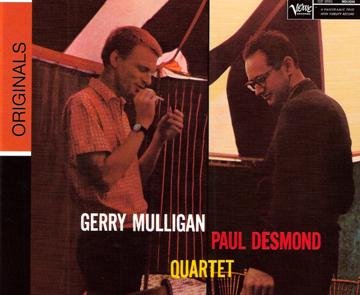1. Blues in Time
2. Body and Soul
3. Standstill
4. Line for Lyons
5. Wintersong
6. Battle Hymn of the Republican
7. Fall Out
Gerry Mulligan - Baritone sax
Paul Desmond - Alto sax
Joe Benjamin - Bass
Dave Bailey - Drums
Gerry Mulligan is probably still best-known for the pianoless quartet
he led with trumpeter Chet Baker in the early 1950s. The group on
this 1957 CD might be described as a variant of that quartet, with
Paul Desmond's alto sax replacing the trumpet. In fact Desmond's clear,
high-pitched alto can readily sound like a trumpet. Joe Benjamin and
Dave Bailey keep the rhythm flowing so well that you hardly notice
the absence of a pianist.
As with the Mulligan quartet, the line-up supplies plenty of opportunities
for counterpoint between the two horns, and the saxophones interweave
joyfully. Mulligan also frequently provides a harmonic base for Desmond
to play above.
Mulligan and Desmond composed three tracks each, while the only jazz
standard is the well-worn Body and Soul. Paul Desmond's opening
title-track gives the saxists the chance to swap solos to and fro.
They take Body and Soul very slowly, and Joe Benjamin anchors
the music with his strong double bass. This track illustrates how
melodiously both the saxophonists extemporise, and they play tag -
responding to one another's inventions in developing the theme.
Standstill is a Mulligan composition (based on the chord sequence
of My Heart Stood Still) which doesn't stay still but moves
along at an easy pace. Line for Lyons was a favourite of the
old Mulligan Quartet and it is educative to compare it with the original.
You might call it a variation on the original concept, retaining the
chamber-music feel. Wintersong is a Paul Desmond tune which
has the lyricism he so often produced with the Dave Brubeck Quartet.
Joe Benjamin's bass is again outstanding here - in fact it seems to
have been recorded more prominently than Dave Bailey's drums, which
are seldom to the fore.
Paul Desmond also wrote Battle Hymn of the Republican (a title
reflecting his Democratic leanings), on which both men get extended
solos. The tune sounds to me as if it is based on the chords of Tea
for Two, which Mulligan played with the Dave Brubeck Quartet when
he sat in with them at Carnegie Hall three years earlier. The all-too-short
programme (barely 46 minutes) ends with Fall Out, a cheerful
Mulligan composition.
In the sleeve-note, Paul says of Gerry: "He just does the right
things". The same might be said of the whole quartet.
Tony Augarde
